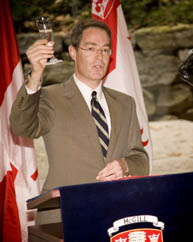Uniting laws and nations
International law takes center stage as McGill announces new Chair on UN Day

Whether it's the bilingual, bicultural surroundings or 150 years of teaching and scholarship in international law, McGill's Law Faculty has long been a breeding ground for future diplomats and international public servants. Which makes it entirely fitting that, this year, the law school marked United Nations Day, October 24th, with the announcement of the Hans and Tamar Oppenheimer Chair in Public International Law.
The Chair was endowed with generous support of Dr. Tamar Oppenheimer, a graduate of McGill and the first Canadian woman to have served as Assistant Secretary-General of the UN. Her 40-year career at the UN also included assignments as Secretary-General of the 1987 International Conference on Drug Abuse and Illicit Trafficking, Director of the Division of Narcotic Drugs and Deputy to the Director General of the UN office in Vienna, where she now lives.
During the event, which was held at the Nahum Gelber Library, Law Dean Nicholas Kasirer said, "Public International Law and its teachings are crucial to establishing the values of the United Nations" here in Canada.
The holder of the Oppenheimer Chair will emphasize international laws and norms in their research and highlight the work of multilateral institutions as well as non-governmental organizations with respect to international laws and how they might be harmonized with national laws. The Chair will also be expected to encourage students to seek careers in public service, be they on the international or the national stage.
Like Dr. Oppenheimer, many McGill graduates and students have gone on to years of service and accomplished careers on the international scene, in particular at the UN. Among the most notable is one of Oppenheimer's former professors, John Peters Humphrey, who was the principal drafter of the United Nations Universal Declaration of Human Rights, adopted in 1948.
A hand-written draft of the Declaration was on display during the UN Day ceremony, a central piece of an exhibit highlighting McGill's contributions to international law. On yellowed paper, in faded pencil, Humphrey recorded the following words: "The provisions of the International Bill of Rights shall be deemed fundamental principles of International Law and of the national law of every member state of the United Nations."
While this text was omitted from the final draft, it serves as an early call for the harmony between global principles and domestic laws that is fundamental to securing human rights and international justice worldwide. Oppenheimer's gift will allow McGill to carry on her life's work and that of her colleagues, and the Faculty of Law will continue to be a leading force in educating and inspiring future diplomats, lawmakers, and public servants.
"Dr. Oppenheimer rightly sees the establishment of this chair at McGill as a gift to Canada," said Kasirer. "We see it as a bold call to action for universities to place the issue of the relationship between international law and domestic law at the centre of Canadian legal education. Her own career stands as a model for students and I see her gift as a commitment to emphasizing international law that will strengthen McGill immeasurably."

